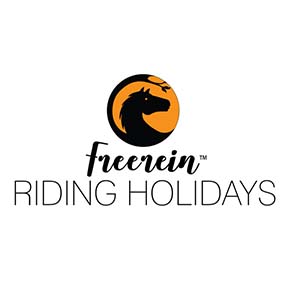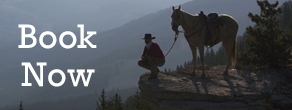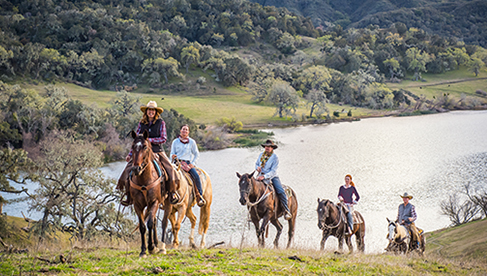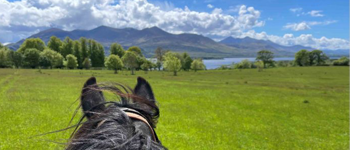Morgan Horses for Trail Riding
Trail Riding on Morgan Horses
Take one of those flashy Morgan show horses out on the trail, “What? You say!”
“Well, yes,” say those of us who have been using this original American breed on the trails for years. The Morgan makes a wonderful trail and family pleasure horse and once the bond between rider and horse is formed, it can last for years. This is why a good Morgan in the 8-year-old and older age group can be hard to find. People who have a Morgan love the horse and rarely part with him.
Morgan owners who have used, bred, and trained the breed for years generally cite the horse’s mind and personality as the biggest reasons they love the horse. Joyce Quigley of Florida, who has done endurance, competitive trail, and just plain pleasure riding on her Morgan stallion Erick says, “I could cite numerous examples of him saving my hide out there on the trail when I thought I knew more than he did, and it turned out I didn’t. I’ve learned to trust him and his instincts and he has always brought me through in fine shape.”
.jpg)
Theresa Slotte of Lazy S Morgans in Grass Valley, CA says, “Morgans are just 'it' for me." They rarely say no to whatever you ask, and most are talented at so many disciplines you can have just one horse to trail ride, work cattle, show, drive, camp, do dressage and then some! On the trail, they can’t be beat. They have enough stamina and energy to make it fun without being exhausting, enough brains and sensibility to stay safe without out thinking of their rider all the time, and the heart and try – all the time – that no other breed can ever come close for me.”
Jackie Dannenberg of Alabama is also a Morgan trail enthusiast. “What I love about my Morgans when I’m riding them is their willingness, eagerness and sense of humor on the trail. I don’t have good trails around the farm. Therefore anytime I ride, I trailer them. They are easy to catch, a pleasure to groom and always interested to see where Mom hauled us off to today! When we arrive at our destination, they are totally at ease. It doesn’t matter if they’ve been there before or not. They are not nervous or stressed. We get going on the trail and their ears are forward, they pay attention to where they are and what’s ahead but always enjoy the experience!”
Betsy MacDonald and her husband Al Puerini have been Morgan enthusiasts for 40 years. “Al and I have an absolute blast on these two horses. I love Morgans for their enthusiasm, their energy, their willingness to go anywhere, their high speed and energetic walk, their huge ground covering trot, the way they'll plow through any pond, through thick brush and really work as a partner. They’re tough, smart, sensible, and they come in with the same high energy that they go out with. Not to mention, they are so great to look at!”

The traditional Morgan has always been a good everyday use horse. They love to work and to be able to get out and see new things and places. They are inquisitive and playful but very level headed. They have the energy and endurance unmatched except for the endurance bred and trained Arab. They can have the ‘go’ for an experienced rider but can quiet right down for the novice as well. They tune in so quickly to their rider and work to please. But they also have an air of dignity and want a rider who respects them as well. I once commented to another Morgan enthusiast that, “…you don’t go for a ride on a Morgan, you ride them,” and she quickly agreed.
Riding a Morgan is a mutually engaging activity. They are giving you everything all the time but want your time and attention as well. If you are looking for a horse to plunk your way down the trail a Morgan may not be the right horse for you. But, if you are looking a true partner on the trail, a horse that will always want to work for you, and a horse that is capable of just about anything and everything, a Morgan may just be the perfect horse.
My own experience with Morgans on the trail has been wonderful. My now 12-year-old gelding, Cambridge Heritage “Harry”, loves activity- any activity - and always wants to see what is down the trail, over the hill, or around the corner. We have done hundreds of miles of trails, horse drives, cattle drives, cattle roundups, an endurance race, and he is great at ponying my young horses. He is patient when he needs to be yet easily disciplined when he needs to be. Crossing water was never a problem, going over a bridge barely slowed him down, and he has never missed a step in the almost nine years I’ve had him.
As Joyce mentioned above, trust is an important issue for a trail horse and I trust him completely. He mixes well with other horses, although he prefers to lead the group. Over the years he has made it clear to me he does not like constant contact in his mouth but prefers a looser set of reins. He knows he is a good horse and wants my trust. But at the same time if I pick up the reins, adjust my seat, or add just a touch of leg he responds immediately. Riding a Morgan is truly a special opportunity. Until you have experienced the wonderful package of energy and enthusiasm combined with a level head and an animal with a true partnering attitude, it may be difficult to understand what riding a Morgan is all about.

When I bought my first Morgan a few years ago I thought a Morgan was a Morgan. That is not the case. Even though the total numbers are smaller than other breeds, there are still a variety of body types and styles of the Morgan horse. If you want a good trail horse then I would suggest looking for something with Government and/or Brunk breeding. These tend to be the sturdier and better muscled horses. When you see a horse in person, watch their movements. I would suggest a horse that moves out with his/her front legs and is well underneath themselves at the hindquarters. Some Morgans are bred to move up with their legs like a park horse and this is usually better for the show ring than the trail.
Mary Jean Vasiloff of Whipporwill Morgans in Connecticut, who has been breeding and training Morgans for 50+ years, has strong but well founded opinions about what makes a good Morgan trail horse.
“For my money, I would seek out the working Western horses of Midwestern and mountain breeding because they come from the combination of old Calvary Remount stock and the using horses of the farmland. These horses were bred to be teammates and fellow workers,” said Jean. “There are breeders all over the United States producing these kinds of horses. We call them Sport Morgans to distinguish them from horses bred intentionally for the show ring. The good ones have a free shoulder, a long reaching stride and a great push from their hindquarters.”

The personality of the horse is also very important. The Morgans with this older breeding are typically bold, yet sensible. According to Mary Jean, “The horse that is forward, willing, and looking over the top of the next hill is a joy. The cheerful, gay spirit of the Morgan, his inquisitive and intelligent mind, and his people loving interaction with his rider make the Morgan a willing partner.”
Carol Nelson is now retired, but for many years she was the breeding manager, trainer and finally the owner of Cambridge Morgans in Colorado. She suggests looking for a horse with a good sloping pastern, as this makes for a comfortable ride, well muscled in the rear end, and a good gaskin which allows them to get up underneath themselves.
“This is the source of power when you are climbing mountains,” states Carol. “You also want a horse with a slightly sloping croup as this also helps with the rear end power.”
The Cambridge Morgan farm supplied horses for years for the Roundup Riders. This group makes a yearly trek along the Continental Divide and generally covers 150 miles or so during the week’s ride.
“When people ask me why ride a Morgan on the trail I always tell them it is their mind. They will figure things out as they go and never get you into trouble,” said Carol.
All of the Morgans shown here are good examples of the type of horse one should look into for the trail. They have good bones, good muscling on the shoulders and hips, a sloping shoulder, and wide set alert eyes and ears forward. They are aware yet relaxed, a typical Morgan Horse.
If you begin looking for a good Morgan trail horse try some of the places where Morgans are ranch bred and trained or bred for the trail. Other sources of good Morgans would include those bred and trained for dressage, reining, jumping, and eventing.
Good places to start are:
The Western Working Morgan Club
The American Morgan Horse Association
The Sport Morgan Association
.jpg) ABOUT THE AUTHOR
ABOUT THE AUTHOR
Steve Simmons is an adventure travel writer and photographer and equestrian who rides, writes and runs an equestrian travel vacation in Albuquerque, New Mexico.
Visit Equitrekking.com's Vacation Guide and Steve Simmons' riding vacation, New Mexico Horse Adventures, for more ideas.
Learn more about Morgan horse history in this video clip.




